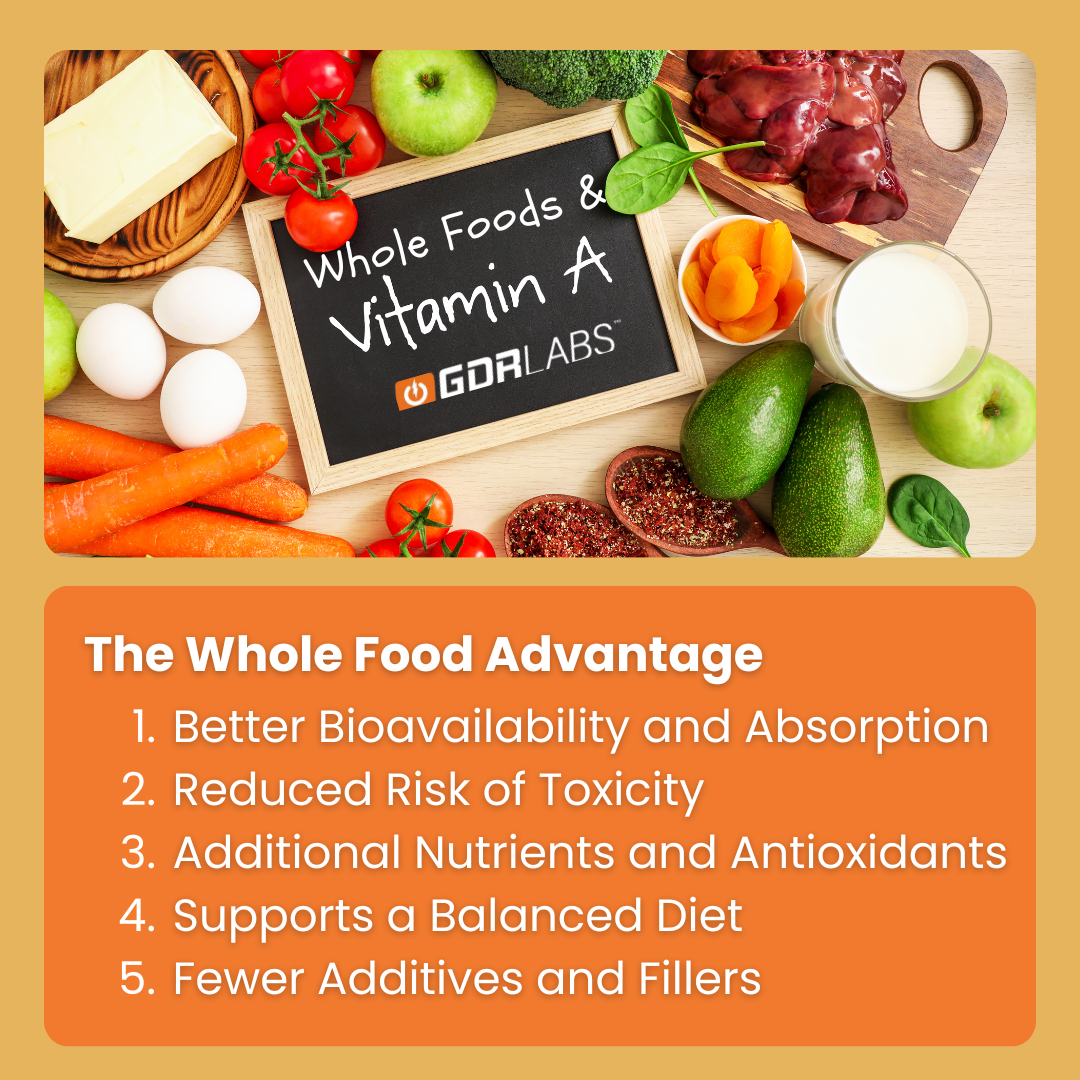From Vitamin A to K; Let’s Start at the Beginning…Updated 8 months ago
From Vitamin A to K; Let’s Start at the Beginning…

As far as maintaining optimal overall health, there are few nutrients as vital as vitamin A. Best known for supporting healthy vision, immune function, and skin health, vitamin A is an essential micronutrient your body needs. It also cannot produce it on its own… so your intake must be accurate to your physician’s recommendations or via RDAs. While supplements are widely available to ensure you get vitamin A, obtaining vitamin A from whole foods is generally considered the safer, more effective choice. Allow me to explain why.
The Advantage of “Supplementing” with Whole Foods
- Increased Bioavailability and Absorption: Vitamin A found in whole foods is often paired with natural fats, which enhance absorption. For example, retinol—the active form of vitamin A found in animal products—is readily absorbed and used by the body. Plant-based foods, like carrots, offer beta-carotene (which provides the orange color in fruits and veggies), a precursor that the body can convert into vitamin A as needed, which reduces the risk of overdose.
- Stay Away From Toxic A Levels: Synthetic vitamin A supplements contain high doses of preformed, synthetic vitamin A (retinyl palmitate or retinyl acetate), which can easily accumulate in the body without proper knowledge of serving sizes and potentially lead to toxicity. Symptoms of vitamin A toxicity may include dizziness, nausea, liver damage, and even congenital disabilities in pregnant women. You don’t want to experience these symptoms, but they are worth repeating. However, whole foods provide vitamin A in more balanced, natural amounts, making it much harder to consume levels associated with toxicity.
- Additional Nutrients and Antioxidants: Whole foods offer a complex matrix of nutrients that work together to boost each other, or “synergistically”. Carrots, sweet potatoes, and leafy greens don’t just provide vitamin A—they also have a ton of fiber, contain vitamins C and E, and possess antioxidants that support overall health and have been shown to combat inflammation.
- Supports a Balanced Diet: When you eat a variety of whole foods rich in vitamin A, it encourages overall dietary diversity (eat different stuff, but a fancy way to say it), which can contribute to better gut health, improved metabolism, and even an increase in long-term disease prevention. When you rely on supplementation, you can sometimes neglect other essential nutrients required for a balanced diet.
- Fewer Additives and Fillers: Vitamin A supplements can contain artificial colors, preservatives, or fillers that may not be well-tolerated by everyone and can even lead to adverse effects in some. On the other hand, whole foods offer a clean, natural source without these unnecessary extra synthetic additives.
So, Where Can I Get Some A?
Animal proteins and by-products are an excellent source for Retinol, Vitamin A’s active form:
- Beef liver – One of the richest sources
- Cod liver oil – High in vitamin A and omega-3 fatty acids (heart-healthy too!)
- Egg yolks
- Butter and ghee (from grass-fed animals)
- Cheese – Especially cheddar and goat cheese
- Milk – Whole milk contains modest amounts
Plant-Based Vitamin A is tasty too! This comes in the form of Beta-Carotene, or Provitamin A:
- Sweet potatoes
- Carrots
- Butternut squash
- Spinach
- Kale
- Collard greens
- Red bell peppers
- Mangoes
- Cantaloupe
- Apricots
Pro Tip: Since beta-carotene is fat-soluble, pair your plant-based vitamin A sources with healthy fats (like olive oil, avocado, or nuts) to boost absorption by the body!
“A” Summary:
Supplements can be helpful in certain medical situations or deficiencies (obviously, we like them). A balanced, whole food diet is the best way to get your daily vitamin A. Period.
Nature packages nutrients in the ideal form and combination for your body to absorb and use efficiently while evading the risks of high-dose synthetic versions… So, the next time you plan your meals, think of colorful (orange and red) fruits and vegetables, leafy greens, and animal products rich in vitamin A.
Your eyes, skin, and immune system will thank you! And you’ll be one step closer to becoming the most optimized version of you!
Remember: Keep it Farmed, not Pharmaceutical!